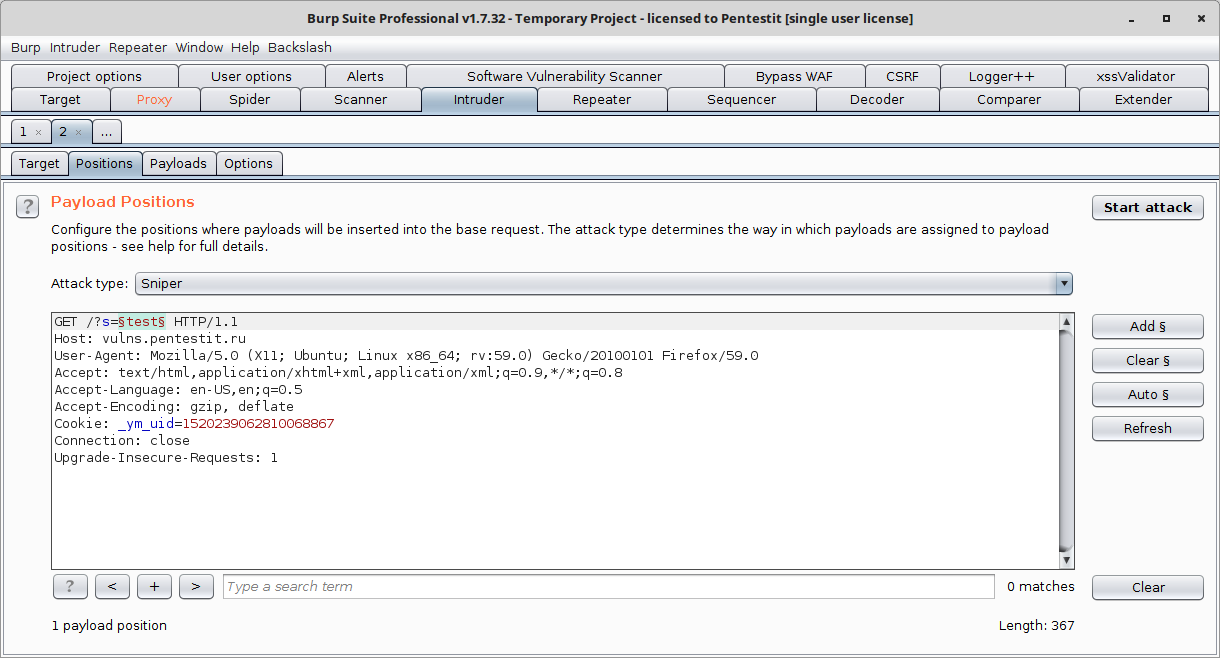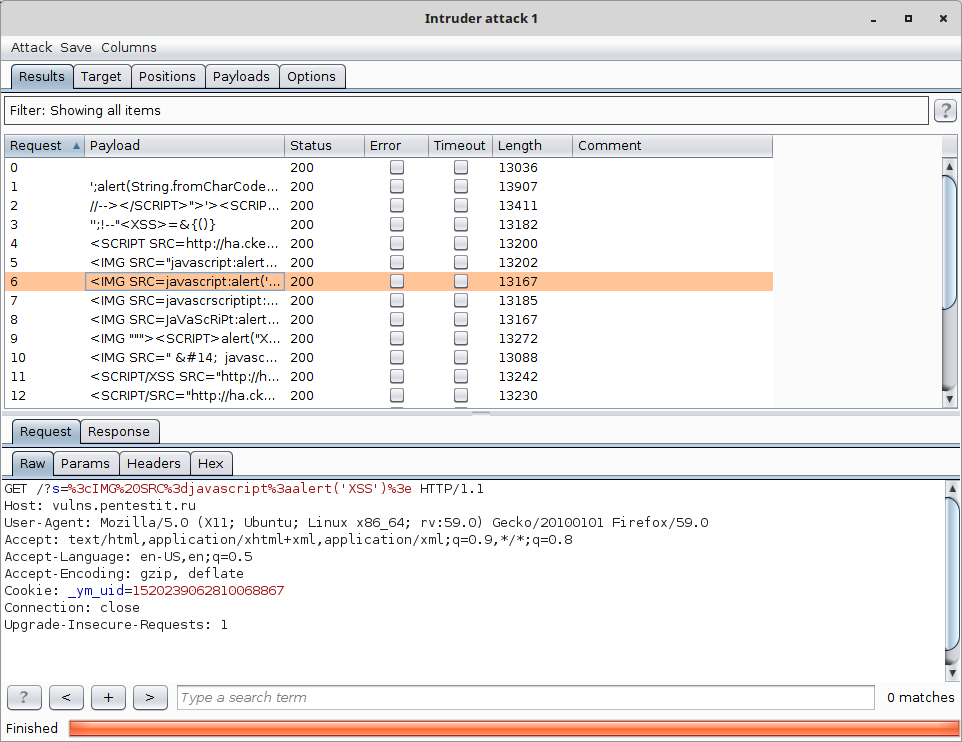Web Application Testing Payloads

The use of payloads (payloads) allows fuzzing a web application to identify anomalies / signs of vulnerabilities. In this article, I will consider several options for payloads for testing web applications.
Payloads
Payloads are a list of sequences of characters, service commands, file names, so-called polyglots , etc. and serve as a semi-automated study of web applications. In simple words - the researcher identifies entry points (input forms, arguments, dynamically fields) and provides payloads as values.
Most modern security tools contain predefined payload lists, usually presented as text files.
For example, to identify critical files with tools like wfuzz or dirb, you can use a good list from Bo0oM .
Payload example:
.ftpquota
.gem
.gfclient/
.gfclient/pass
.git
.git-credentials
.git-rewrite/
.git/
.git/config
.git/HEAD
.git/index
.git/logs/
After the web application has been investigated, a site map has been compiled, web forms, inputs, parameters and arguments have been identified - you can start testing. To do this, select the payload application position (using Burp Suite as an example):

After selecting the position, select the list of payloads to apply, if necessary, set the selection signs (to filter the results) and launch the attack:

To identify different vulnerabilities, different sets of payloads collected in or other "assemblies" and distributed by type.
Payloads All The Things
Payloads All The Things - one of the most popular payload repositories, contains the following categories (which is enough for almost “all occasions” of testing web applications):
CRLF injection;
Methodology and Resources;
Remote commands execution;
Web cache deception;
CSV injection;
NoSQL injection;
Server Side Template injections;
XPATH injection;
CVE Exploits;
OAuth;
SQL injection;
XSS injection
File Inclusion - Path Traversal;
Open redirect;
SSRF injection;
XXE injections;
Insecured source code management;
PHP juggling type;
Tar commands execution;
Java Deserialization;
PHP serialization;
Traversal directory.Seclists
SecLists is another popular “assembly” of payloads designed for testing web applications and network infrastructure.
This assembly is notable for the more “narrow” specialization of payloads for specific types of vulnerabilities. For example, it contains specialized payloads for XSS:
XSS-BYPASS-STRINGS-BRUTELOGIC.txt;
XSS-BruteLogic.txt;
XSS-JHADDIX.txt;
XSS-RSNAKE.txt;
XSS-Vectors-Mario.txt;
XSS-WITH-CONTEXT-JHADDIX.txt.Specialized payloads for SQL / NoSQL injection:
MSSQL-Enumeration.fuzzdb.txt;
MSSQL.fuzzdb.txt;
MYSQL.fuzzdb.txt;
Metacharacters.fuzzdb.txt;
MySQL-Read-Local-Files.fuzzdb.txt;
MySQL-SQLi-Login-Bypass.fuzzdb.txt;
NoSQL.txt.Intruder payloads
Intruder Payloads - Payload repository by BruteX, Sn1per and Findsploit. In addition to fuzzing sheets, it contains attack paylodes for various BurpSuite utility tools (repeater, intruder):
01_burpattack_basic_methods;
01_burpattack_dirbuster;
01_burpattack_fast_fuzz;
02_burpattack_vulnerabilities_all;
03_burpattack_find_inject;
03_burpattack_find_injectx;
04_burpattack_basic_fuzz;
04_burpattack_sqli_quick_fuzz;
05_burpattack_full_fuzz;
burpattack_basic_auth_brute;
burpattack_brute_force;
burpattack_command_exec;
burpattack_find_injectx;
burpattack_nums_1-100;
burpattack_overflow;
burpattack_server_side_include;
burpattack_shellshock;
burpattack_sqli_authbypass;
burpattack_sqli_error_based;
burpattack_sqli_quick_fuzz;
burpattack_sqli_time_based;
burpattack_url_attacks;
burpattack_wordpress;
burpattack_xmlrpc_dos;
burpattack_xpath_injection;
burpattack_xss;
burpattack_xss_stored;
burpattack_xxe;
burpconfig_default;
burprepeater_xxe;
shellshock_attack.Fuzzdb project
Fuzzdb contains lists of various payloads. For testing web applications, the “attack” list will be useful:
business-logic;
control-chars;
disclosure-directory;
disclosure-localpaths/unix;
disclosure-source;
email;
file-upload;
format-strings;
html_js_fuzz;
http-protocol;
integer-overflow;
ip;
json;
ldap;
lfi;
mimetypes;
no-sql-injection;
os-cmd-execution;
os-dir-indexing;
path-traversal;
redirect;
rfi;
server-side-include;
sql-injection;
string-expansion;
unicode;
xml;
xpath;
xss.Foospidy
The Foospidy repository contains a list of payloads for identifying critical files and folders on a web server:
apache-user-enum-1.0.txt;
apache-user-enum-2.0.txt;
directory-list-1.0.txt;
directory-list-2.3-big.txt;
directory-list-2.3-medium.txt;
directory-list-2.3-small.txt;
directory-list-lowercase-2.3-big.txt;
directory-list-lowercase-2.3-medium.txt;
directory-list-lowercase-2.3-small.txt.These payloads will help form the basis for the application of various attacks, including obfuscation of payloads , their modification and combination.
